2-day IOS national meet on
Maulana Manazir Ahsan Gilani
December 1-2, 2018 at at A.N. Sinha Institute of Social Studies, Patna
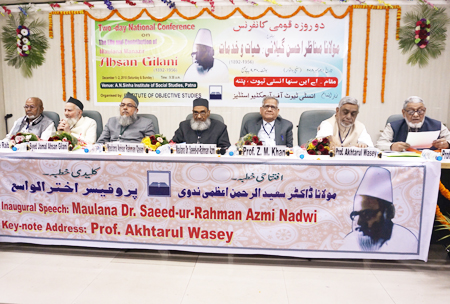
L-R: Dr. Syed Fazle Rab, IOS Patna chapter; Syed Jamal Ahsan Gilani, nephew of Maulana Gilani; Maulana Anisur Rahman Qasmi, Nazim, Imarat Shariah, Bihar, Orissa and Jharkhand; Maulana Dr. Saeed-Ur-Rahman Azmi, principal, Darul Uloom Nadwatul Ulama, Lucknow; Prof. ZM Khan, secretary general, IOS; President, Prof. Akhtarul Wasey, Maulana Azad University, Jodhpur, Rajasthan; Prof. Alauddin Ahmad, former vice-chancellor, Jamia Hamdard, New Delhi
A two-day national conference on “The Life and Contributions of Maulana Manazir Ahsan Gilani” (1892-1956), was organised by the Institute of Objective Studies at A.N. Sinha Institute of Social Studies, Patna on December 1-2, 2018. Maulana Manazir Ahsan Gilani, an eminent Islamic scholar of British India, was born on October 1, 1892 in a small village, Gilan, in Nalanda district about 100 km from Patna. He is often referred to as “Muhaqqiq-i-Islam” (researcher of Islam), “Sultan-ul-Qalam” (king of pen) and “Mutakallim-i-Millat” (spokesman of the community). The conference was a befitting tribute to him as an Islamic scholar and writer of repute. The conference was spread over eight sessions, including inaugural and valedictory sessions.
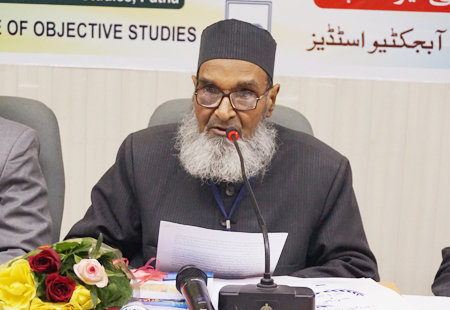
The conference was inaugurated by Maulana Dr. Saeed-Ur-Rahman Azmi, principal, Darul Uloom Nadwatul Ulama, Lucknow. Dr. Azmi, in his inaugural speech, said that Maulana Gilani had carved out a niche for himself as an acclaimed Islamic scholar, teacher, researcher, writer and speaker of the twentieth century. His style of writing was unique in the sense that it freed itself from semantic and philosophical complexities. Shorn of stylistic pretensions, his writings were imbued with knowledge and research.
The language he used to write was literary and pleasant. It came out of up-to-date knowledge of his subject. Quoting Maulana Syed Abul Hasan Ali Nadwi, he said that “Maulana Gilani was undoubtedly a scholar of broad vision, deep study, and it was difficult to find his parallel in knowledge and erudition in the Islamic world”.
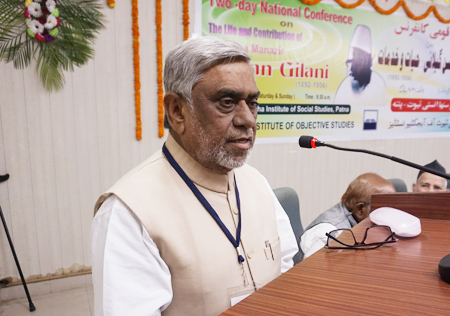
In his key-note address, President, Maulana Azad University, Jodhpur, Rajasthan, Prof. Akhtarul Wasey, described Maulana Manazir Ahsan Gilani as a great philosopher and the messiah of the Muslim community. His work in Islamic Studies and other branches of knowledge was more than what could be expected of the entire community. No discussion on Islamic Studies in the sub-continent was possible without reference to the works of Maulana Gilani. He said that the maulana’s personality was multi-faceted and each facet deserved to be made a topic of study and research.
He was a great writer and his area of work extended to research on the Quran, hadith, Islamic jurisprudence, seerah, history, education, politics and other disciplines. Besides, he was an orator of rare quality as his language used to be lucid containing mellifluous words. A translator par excellence, the maulana was also a perfect teacher and an accomplished journalist. He observed that the maulana’s books on hadith and fiqh, Tadveen-e-Hadith and Tadveen-e-Fiqh, were rated among the finest works. His book on the life of Prophet Muhammad (PBUH), Annabi-Al-Khatim is regarded as one of the few books on the subject in Urdu which deals with untouched aspects and is known for its diction and style.
Savanih-e-Qasmi and Tadhkirah Shah Waliullah are his biographical sketches of two eminent Islamic scholars which drew appreciation from Maulana Ashraf Ali Thanvi, who prophesied that the author of this book would one day become a great alim.
His editorials in journals like Al-Qasim and Al-Rasheed were the best examples of his journalistic talent. He remarked that by translating Shah Ismail Shaheed’s book Aaqbat and Sadruddin Shirazi’s book Asfar-i-Arba in Urdu, Maulana Manazir Ahsan Gilani proved that he perfected the art of translation as well. His book Hindustan mein Musalmano ka Nizam-i-Taleem wa Tarbiyat has assumed a special place in Urdu literature.
Commenting on the book, Maulana Abdul Majid Daryabadi said, “It is a surging sea of subjects. Innumerable pieces of history have surfaced. This is a repository of valuable information and a treasure of intellectual argumentation”. The maulana’s scholastic eminence was indisputable, he added.
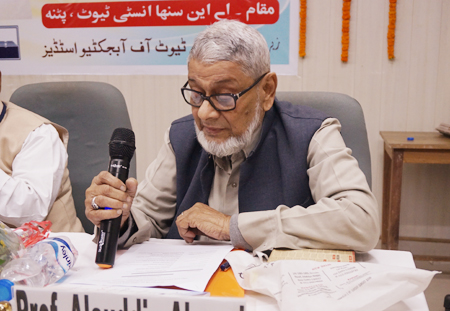
Speaking as a guest of honour, Prof. Alauddin Ahmad, former vice-chancellor, Jamia Hamdard, New Delhi, said that Maulana Gilani evinced keen interest in tasawwuf (sufism), and its influence on his life and work was discernible. Recognising Maulana Gilani’s abundance of theological knowledge and his contribution to it, he said that the IOS was credited with organising a seminar on such a grand scale. It was also noteworthy because the Institute played an important role in introducing the maulana to the outer world, he noted.
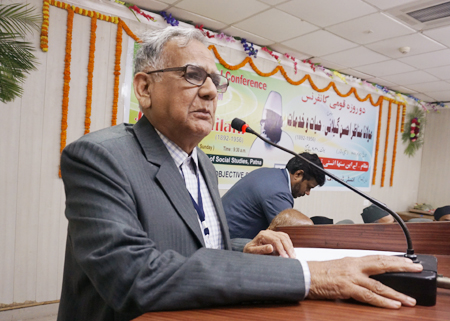
In his presidential remarks, Prof. ZM Khan, secretary general, IOS, described Maulana Manazir Ahsan Gilani as a great scholar and genius and held that his research-based work would prove fruitful for the new generation of researchers and scholars. He expressed the confidence that facets of the maulana’s personality unknown so far would come to light at the seminar affording the participants and audience an opportunity to benefit from the discussions. Referring to a decision taken by the Institute in the recent past, he said that besides researches, seminars would be organised on eminent personalities.
While one year would be exclusively devoted to seminars on the personalities of international fame, the following year would be focused on symposia on the personages that earned a name to reckon within the country. He said that an international conference on Prof. Ismail Raji al-Faruqi, was organised a few months ago, followed by a national seminar on the life and works of Dr. Mohammad Hamidullah. The conference on Maulana Manazir Ahsan Gilani formed a part of the larger programme, he remarked.
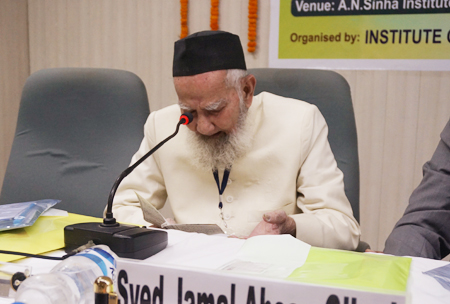
Earlier, the conference got off to a start with the recitation of a verse from the Quran by the in-charge of the Urdu section, IOS, Maulana Shah Ajmal Farooq Nadwi. A naat (a verse in praise of Prophet Muhammad [PBUH]), written by Maulana Manazir Ahsan Gilani was also recited on the occasion by Syed Jamal Ahsan Gilani, nephew of Maulana Gilani.
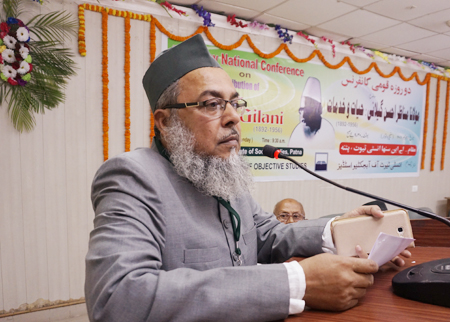
In his welcome address, Maulana Anisur Rahman Qasmi, Nazim, Imarat Shariah, Bihar, Orissa and Jharkhand, held that the land of Bihar had produced a number of renowned personalities. To name a few, Allama Suleiman Nadwi, Maulana Abul Mohasin Mohammad Sajjad and Qazi Mujahidul Islam Qasmi were born here. Maulana Manazir Ahsan Gilani, a son of Bihar, left an indelible imprint on education, economy, sociology and several other subjects of study with his books. His books on seerah and tafsir were of high standard. He was all praise for the IOS for its activities in research on issues of minorities, especially Muslims, and other deprived sections of society.
While Prof. Ishtiyaque Danish, finance secretary, IOS, gave a brief account of the activities of the Institute and introduced the theme of the conference, Mohammad Akhtar Adil Gilani, a member of the Gilani family, presented the profile of Maulana Manazir Ahsan Gilani. According to him, Maulana Gilani’s ancestors came to Delhi from Jilan in Iraq during the reign of Sultan Feroz Shah Tughlaq and later moved to Bihar and settled down in Gilan, a place about 20 km of Nalanda.
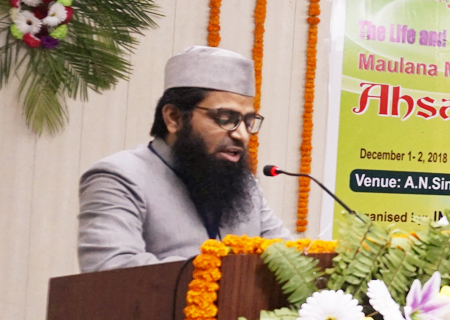
Maulana Shah Ajmal Farooq Nadwi reading out a message of Maulana Syed Mohammad Rabey Hasani Nadwi, rector, Nadwatul Ulema and President, All India Muslim Personal Law Board
A message from Maulana Syed Mohammad Rabey Hasani Nadwi, rector, Nadwatul Ulema and President, All India Muslim Personal Law Board, who could not make it to the conference on account of his indisposition, was read out by Maulana Shah Ajmal Farooq Nadwi. In his message, Maulana Rabey said that Maulana Manazir Ahsan Gilani was a great scholar and some of his qualities made him far superior to his contemporaries. His knowledge had many facets and so long he was alive, his pen continued to flow. He enriched Islamic literature with his writings. By writing books like Annabi-al-Khatim, Hazrat Abuzar Giffari, Ad-Deen al-Qayyim, Islami Ma’ashyat, Hindustan mein Musalmano ka Nizam-e-Taaleem wa Tarbiyyat, Imam Abu Hanifa ki Siyasi Zindagi, Tazkirah Shah Waliullah, Savanih-e-Qasmi, Tazkir ba-Surah al-Kahf, Tadveen-e-Hadith and Tadveen-e-Fiqh would continue to guide researchers in their quest for knowledge. Apart from books, he also contributed articles to almost every journal of repute, the Maulana’s message said.
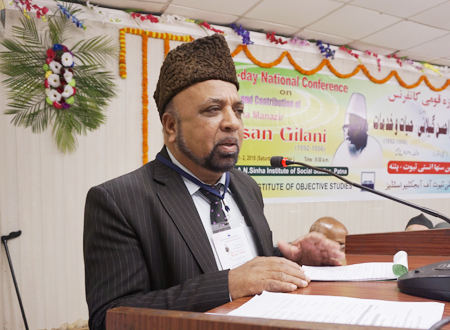
Prof. Ishtiyaque Danish reading out a message of Dr. Mohammad Manzoor Alam, chairman, IOS
A message of IOS chairman, Dr. Mohammad Manzoor Alam, who could not attend the conference as he was not well, was read out by Prof. Ishtiyaque Danish. In his message, Dr. Alam said that knowledge always acted as a catalytic agent for change in the world. Every knowledge that promoted destruction and nurtured personal ambition led to catastrophic change as against peace and tranquility resulting from the knowledge aimed at human welfare and the good of common people.
Such knowledge was not arbitrary and treated everyone as equal. He stressed that the reality behind the revolutions influenced by knowledge should be properly understood. In this connection, he quoted Maulana Abul Kalam Azad who advised against ostentation. Under the obtaining conditions, he said, we must spread Islam’s message of human values and apply a healing touch to the suffering humanity by following the teachings of the Quran. We would fail in our duty to honestly introduce Islam to the world if the entire humanity was not factored in. Referring to the IOS’ Journey during the past 32 years, he said that it was engaged in this task in every possible way. “We wished to share our experience during the period with all stakeholders”, his message said. Besides those commanding respect among the Ummah and Muslim scholars, non-Muslim brethren with positive thinking played a decisive role in the success of the efforts of the Institute. Despite limited resources, the IOS got laurels from the community and enlightened sections of the country. This was due to the fact that the Institute did not focus on one community, but undertook a mission to take in its stride the entire humanity. He reiterated the commitment to carry on with the mission in future also.
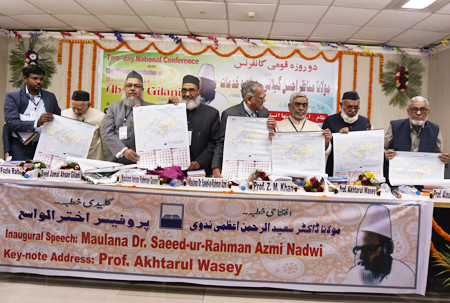

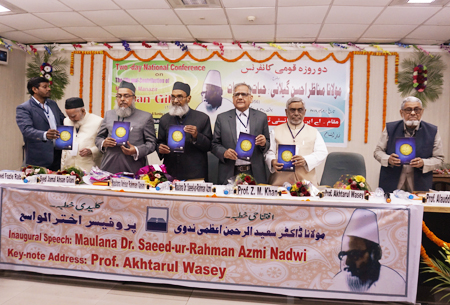

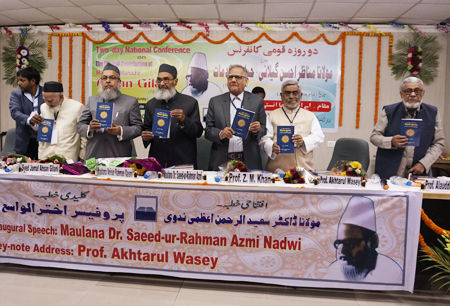
A view of Calaner and books release
The inaugural session of the conference was marked by release of IOS Calendar-2019, and four books, viz, Mashahir-e-Shero Adab by Prof. Mohsin Usmani, Fikre Islami ki Afaqiat by Dr. Syed Abdul Bari, The Relevance of Prophet Muhammad’s Life and Teachings in an Insecure and Fragile World (Hindi translation) by Prof. AR Momin, and Mashahir key Khatoot by Dr. Atiqur Rahman.
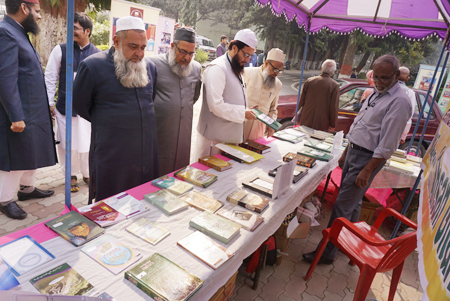
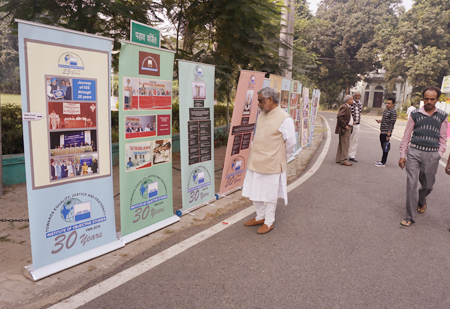
A view of exhibition
An exhibition of books published by the IOS and those written by Maulana Manazir Ahsan Gilani, was organised. Standees giving a brief description of earlier IOS conferences and programmes were also displayed.
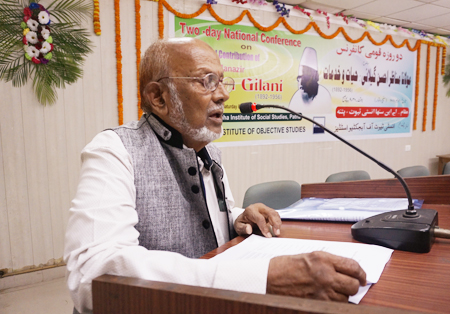
While the proceedings of the seminar were conducted by the honorary director, IOS Patna chapter, Dr. Syed Fazle Rab, a vote of thanks was proposed by the vice-chairman, IOS, Prof. M. Afzal Wani.
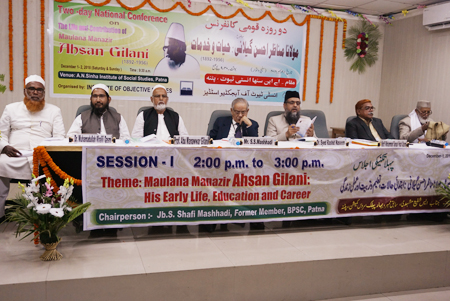
Business Session-I
The conference was followed by a business session on “Maulana Manazir Ahsan Gilani: his early life, education and career”. The session was chaired by Mr. S. Shafi Mashhadi, ex-member, Bihar Public Service Commission. The first speaker of the session was Mufti Mohammad Sanaul Hoda Qasmi, deputy nazim, Imarat Shariah, Bihar, Orissa and Jharkhand, who presented a paper on “Hazrat Maulana Syed Manazir Ahsan Gilani: Ahwaal-o-Asaar”. While Dr. Muhamadullah Khalili Qasmi, web-editor, Darul Uloom Deoband, focused on “Maulana Manaẓir Aḥsan Gilani: His early life at Deoband as student, editor and teacher”, Dr. Syed Rashid Naseem, professor, deptt. of Arab Studies, EFL University, Hyderabad, spoke on “Tahqeeqat-e-Gilani ki nudrat wa afaaqiat”. Prof. Abu Manawwar Gilani, former head, deptt. of Urdu, BBRA Bihar University, Muzaffarpur, touched upon “Maulana Manazir Ahsan Gilani ki shakhsiyat aur shayeri”. He was followed by Dr. Zain Ramish, lecturer in a college in Hazaribagh, Jharkhand, and Mr. Taqi Firdausi from Patna. Prof. Ahmad Sajjad, former dean, faculty of humanities and chairman, deptt. of Urdu, Ranchi University, sent his paper on “Maulana Manazir Ahsan Gilani: Mukhtasar aapbeeti” which was read out by Maulana Shah Ajmal Farooq Nadwi.
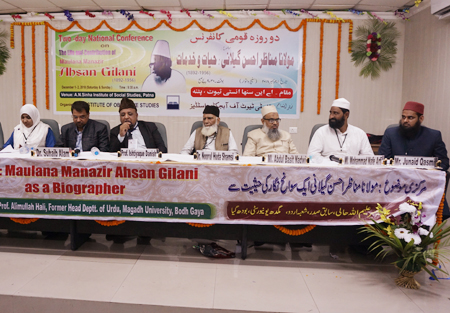
Business Session-II
This business session was devoted to the themes “Maulana Manazir Ahsan Gilani as a biographer” and “Maulana Manazir Ahsan Gilani’s works on Islamic sciences”. Prof. Ishtiyaque Danish was in the chair. Dr. Suhaib Alam, asstt. professor, deptt. of Arabic, Jamia Millia Islamia, New Delhi, presented his paper on “Makkah Mukarramah aur Madinah Munawwarah ka samaji, deeni aur saqafati manzarnama, Maulana Manazir Ahsan Gilani ke safarname ‘Dayare Nabuwat ki Hazri’ ki roshni mein”. While Dr. Noorul Huda Shamsi from Patna focused on “Maulana Gilani bahaisiyat shayar”, Maulana Junaid Qasmi, teacher of fiqh and tafseer, Jamia Rahmani, Munger, spoke on “Uloom-e-Islami ke maidan mein Maulana Manazir Ahsan Gilani ki khidmaat’. Maulana Mohammad Nafe Arfi, Ma’ahad al-Wali al-Islami, Harsinghpur, Darbhanga, who dwelt on “Uloom-e-Islami ke maidan mein Maulana Gilani ki khidmaat ka ma’aruzi muta’ala” was followed by Maulana Abdul Basit Nadwi, al-Ma’ahad al-Aali, Imarate Shariah, who presented his paper on “Uloom-e-Islami ke maidan mein Maulana Manazir Ahsan Gilani ki khidmaat: Tadveen-e-Quran ke khususi hawaale se”. While Dr. Sabah Ismail Nadwi Alig., Kolkata, concentrated on “Maulana Gilani bahaisiyat mahirey Quraniyat’. Dr. Najmus Sahar, asstt. professor, deptt. of Islamic Studies, Jamia Hamdard, New Delhi, threw light on “Maulana Manazir Ahsan Gilani aur tadveen-e-fiqh: Eik jayeza”.
Second Day
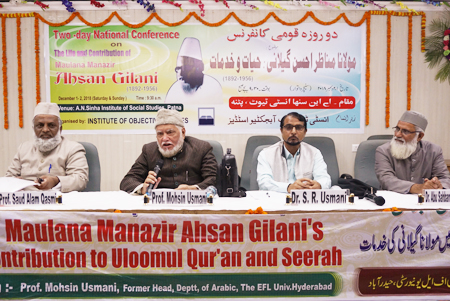
Business Session-III
The second day of the conference began with the third session which was focused on “Maulana Manazir Ahsan Gilani’s contribution to Uloomul Qur’an and Seerah”. While Prof. Mohsin Usmani, former head, deptt. of Arabic, EFL University, Hyderabad, chaired the session, Prof. Saud Alam Qasmi, former chairman, deptt. of Sunni Theology, AMU, Aligarh, spoke on “Maulana Manazir Ahsan Gilani ki qurani baseerat”. Dr. Abu Sahban Ruhul Quds Nadwi, Nadwatul Ulema, Lucknow, presented his paper on “Maulana Manazir Ahsan Gilani ki eik giranqadar tasneef: Tadveen-e-Hadees”, and Dr. S. R. Usmani, Bhatkal, Karnataka, dwelt upon “Maulana Manazir Ahsan Gilani aur Seerat-e-Rasool (SAW)”.
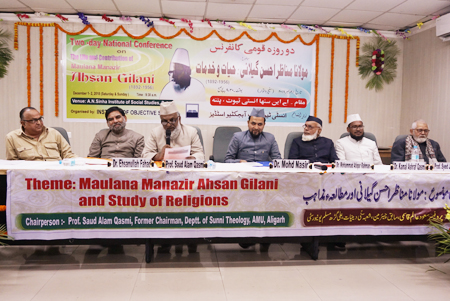
Business Session-IV
The fourth business session was devoted to “Maulana Manazir Ahsan Gilani and the Study of Religions” with Prof. Saud Alam Qasmi in the chair. The session began with Dr. Mohammad Atiqur Rahman’s presentation on “Maulana Manazir Ahsan Gilani bahaisiyat tazkarah nigaar” followed by Dr. Kamal Ashraf Qasmi, asstt. professor, deptt. of Islamic Studies, Aliah University, Kolkata, who spoke on “Maulana Manazir Ahsan Gilani ka muta’lae shobae mazhibe aalam” He was followed by Dr. Ehsanullah Fahad, asstt. professor, deptt. of Sunni Theology, Women’s College, AMU, Aligarh, who discussed “Quran-e-Paak ke Saabeyin aur Buddha mat ke pairu: Maulana Gilani ki tahqeeq ka ma’aruzi jayeza”. While Dr. Mohammad Nasir, asstt. professor, deptt. of Sunni Theology, AMU, Aligarh, shed light on “Tasawwuf aur Maulana Manazir Ahsan Gilani’. Prof. Syed Jamaluddin, former professor of history, Jamia Millia Islamia, presented his paper on “Maulana Manazir Ahsan Gilani: A Profile”. He was followed by Dr. Masoom Aziz Kazmi, IPS (retired), Gaya, who shared his views on the life and times of the maulana.
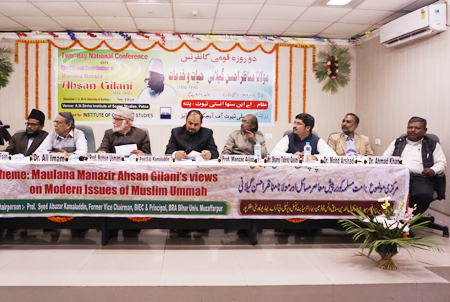
Business Session-V
The fifth session was focused on “Maulana Manazir Ahsan Gilani’s views on modern issues of Muslim Ummah”, with Prof. Syed Abuzar Kamaluddin, former vice-chairman, Bihar Intermediate Education Council in the chair. The session had Prof. Mohsin Usmani as the first speaker. He threw light on “Islamic hostels -Maulana Manazir Ahsan Gilani ka khwaab jo tishnae tabeer hai”. He was followed by Dr. Ali Imam, former principal, District Institute of Education, HCTE member, Eastern Zone, who spoke on “Maulana Manazir Ahsan Gilani: Nezam-e-taleem wa tarbiyat ke chand nikat’. While Prof. Manzar Aijaz, head, P.G. deptt. of Urdu, A. N. College, Patna, gave his talk on “Maulana Manazir Ahsan Gilani aur Iqbal: Islam key ma’ashi nizam key tanazur mein”. Dr. Mohammad Arshad, asstt. professor, deptt. of Islamic Studies, Jamia Millia Islamia, New Delhi, presented his paper on “Hindustan mein musalmano ka nizame taleem wa tarbiyat: Maulana Gilani ke hawale se”, Dr. Ziauddin Malik Falahi, asstt. professor, deptt. of Islamic Studies, AMU, Aligarh, discussed “The riba (Sud): A study of Gilani and Maududi”. While Mr. Shams Tabrez Qasmi, editor, Millat Times, New Delhi, spoke on “Maulana Manazir Ahsan Gilani ka taleemi nazariya aur madaris mein raej nisabe-taleem”. Dr. Ahmad Khan, lecturer, KMMS, Satellite Campus of MANUU, Darbhanga, talked about “Maulana Gilani ke safarname ‘Dayare nabuwat ki hazri’ ki tarikhi ahmiyat: Eik jayeza”.
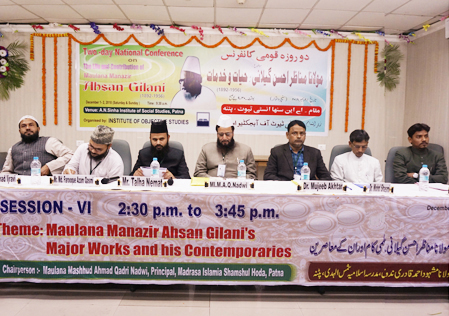
Business Session-VI
The sixth business sessions were devoted to “Maulana Manazir Ahsan Gilani’s major works and his contemporaries”. The sessions were chaired by Maulana Mashhood Ahmed Qadri Nadwi, principal, Madarsa Islamia Shamsul Huda, Patna. As the first speaker of the session, Dr. Mujeeb Akhtar, asstt. professor, deptt. of Arabic, University of Delhi, presented his paper on “Maulana Manazir Ahsan Gilani apni nigarishaat ke aaine mein”. He was followed by Dr. Mohammad Shamim Akhtar Qasmi, asstt. professor, deptt. of Islamic Studies, Aliah University, Kolkata, who spoke on “Maulana Manazir Ahsan Gilani aur Mufti Mohammad Zafeeruddin Miftahi ke ta’alluqat par eik nazar”. Mr. Talha Nemat, former teacher, Jamia Imam Ahmad bin Irfan Shaheed, Malihabad, focused on “Maulana Gilani ki kitaab ‘Tazkerae Shah Waliullah’ aur Hazrat Maulana ke afkaar wa khayalaat’. While Mr. Mohammad Farooque Azam Qasmi, Ph.D scholar, JNU, New Delhi, centered on “Maulana Manazir Ahsan Gilani ke mohaqqeqeen, naqedeen aur mubassereen: Eik tajziyati muta’ala”. Mr. Abrar Ahmad Ijravi from Madhubani spoke on “Maulana Manazir Ahsan Gilani ke taleemi afkaar-o-nazariyaat”. Mr. Mohammad Ismail Islahi, research scholar, deptt. of Sunni Theology, AMU, presented his views on “Maulana Abdul Bari aur Maulana Manazir Ahsan Gilani ke bahmi marasim”. Dr. Shakil Ahmad Qasmi from Orientel College, Patna, was the last speaker, who touched upon the different aspects of the life of the maulana.
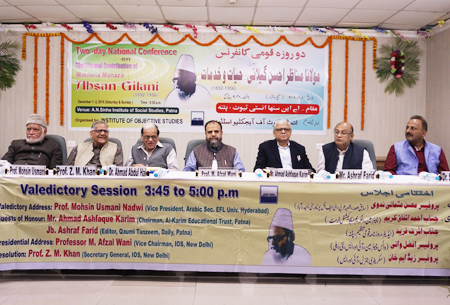
Valedictory Session
Prof. Mohsin Usmani, who delivered the valedictory address, stressed the need for making efforts to end the existing communication gap between Muslims and other communities. In the initial years of the establishment of Islam, warmth and hospitality attracted non-Muslims to come close to Islam. Regular interactions with the opponents of Islam helped allay many misconceptions and understand the concept of the oneness of Allah and Mohammad being His Prophet (PBUH). According to him, inter-faith dialogue was need of the hour to dispel misgivings about Islam and its followers. This assumed special importance in today’s context as communal forces were hell-bent on tearing apart age-old tapestry of harmony and mutual love between Hindus and Muslims. He also called for communication between the two communities in their own language because the local language was an effective means of exchange of ideas. He noted that the fall of Islam in Spain was caused by infrequent interface between Muslims and Christians. Maulana Gilani left a rich legacy of inter-religious dialogue, he added.
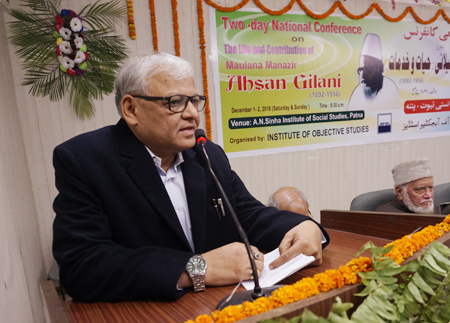
Mr. Ahmad Ashfaque Karim, chairman, Al-Karim Educational Trust and founder, Katihar Medical College and Hospital, who was the guest of honour, held that Maulana Manazir Ahsan Gilani was a great man and an historical figure. Besides being a multi-faceted scholar of international fame, he was a votary of Hindu-Muslim unity. In his works also the maulana advised Muslims to cultivate amiable relationship with Hindus and live in perfect harmony. He expressed his commitment to establish an institution and a university in Maulana Gilani’s name. Besides, a research team would be put in place to go into the works of Maulana Gilani, he added.
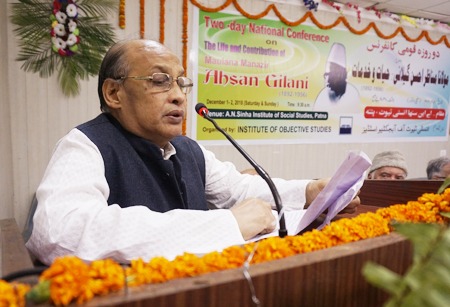
Mr. Ashraf Farid, editor, Urdu daily, Qaumi Tanzeem, Patna, observed that while turning over the pages of old files of his newspaper, he found that the articles written by the maulana were of high standard. It convinced him that the maulana was an institution in himself. He was a commentator and had an expertise in the study of hadith. He was also a litterateur, educationist and an economist at the same time. He said that he was proud of the maulana born in Bihar, the land that had produced innumerable pearls.
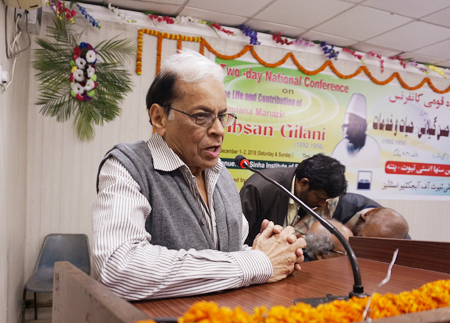
Dr. Ahmad Abdul Hai, an eminent surgeon, recalled his association with Maulana Gilani during his childhood. He said that the maulana was very simple. He patronised intellectuals. His face was glowed with spirituality. Such great personalities were rare, he added.
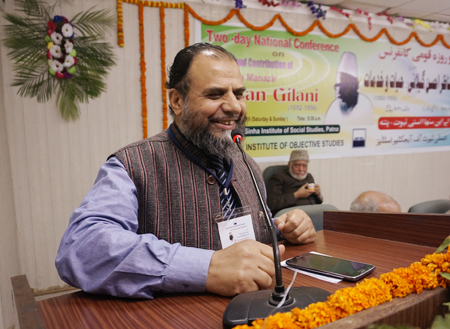
In his presidential remarks, Prof. M. Afzal Wani described Maulana Gilani as a versatile scholar who was a thinker and writer of repute. Persons like the maulana were a gift from Allah to the Ummah, so that the Muslim community did not lag behind other communities. He said that the depth of Maulana Gilani’s work could not be gauged and comprehended by commoners. He compared the educational and judicial ideas of Maulana Gilani with modern concepts. He observed that the maulana’s vision of Islamic jurisprudence was far superior to those of modern jurists. He emphasised the need for moving ahead with the ideas of such personalities and imbibing them in order to create new vistas of research.
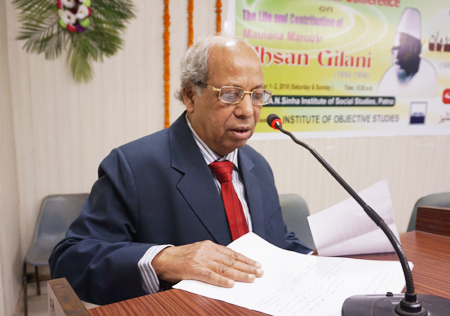
While proceedings of the valedictory session were conducted by senior advocate and social activist from Gaya, Mr. Faiyaz Hali, a vote of thanks was extended by Dr. Saad bin Hamid, assoc. professor, Soghra College, Bihar Sharif.
A seven-point resolution, unanimously adopted by the delegates, was read out by Prof. ZM Khan. The resolution read as below:
1. The Muslim Ummah is passing through a testing phase. It needs a review of existing paradigms and methodologies in the light of challenges Muslim communities are facing. In the light of thoughts and ideas of persons like Maulana Manazir Ahsan Gilani, a well thought out plan and strategy may be developed to deal with future challenges.
2. The Institute of Objective Studies, New Delhi, would welcome suitable research proposals on different aspects highlighted in the conference. All those who are interested may submit the proposals to the IOS.
3. A serious effort should be made to adopt the philosophy of Tawhidi formulations, which basically believe in the unity of God, unity of creation and unity of knowledge. Future researches should fall within this paradigm.
4. There may be special effort to reach and propagate interfaith common grounds of harmony and good will. Islam puts immense stress on creating a balanced world view by adopting the middle path and avoiding extremes as Islam is a communitarian religion.
5. A blue print for establishing Islamic hostels should be tried seriously. It may prove to be a starting point in the right direction.
6. This conference appeals to all concerned to adopt a scientific approach to study and understand the text in its context. It would not divide knowledge into religious and non-religious categories. Efforts of people likes Maulana Manazir Ahsan Gilani are noteworthy in this area. This approach should be popularised among people.
7. Efforts should be made to get approval of government of Bihar to create a chair in the name of Maulana Manazir Ahsan Gilani at one of the universities of Bihar. The Institute of Objective Studies may initiate the process to approach the government.
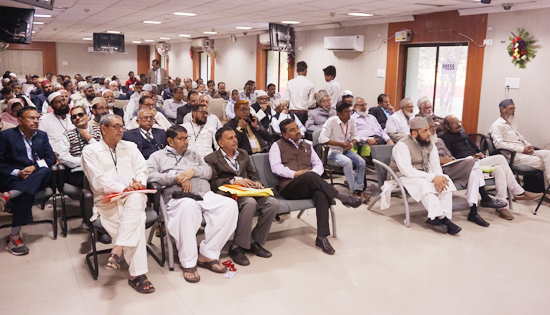
A view of audience
Report in Urdu
|